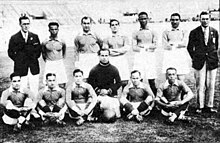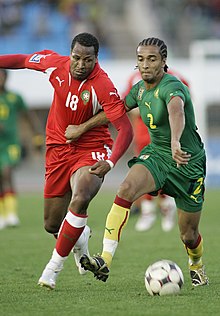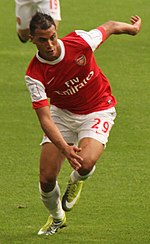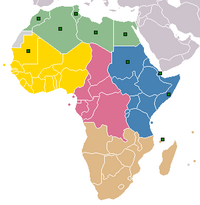Introduction
Football is the most popular sport in Africa, alongside basketball. Indeed, football is probably the most popular sport in every African country, although rugby and cricket are also very popular in South Africa. The first football stadium to be built in Africa was the Alexandria Stadium in 1929.
The English Premier League is the most popular sports league in Africa. The most popular clubs in Africa are Arsenal, Chelsea and Manchester United. (Full article...)
This section may be unbalanced toward certain viewpoints. (October 2022) |

Selected article -
Association sportive des Forces armées royales (transl. Sports Association of the Royal Armed Forces, Arabic: الجمعية الرياضية للقوات المسلحة الملكية), abbreviated as AS FAR (Arabic: نادي الجيش الملكي, romanized: Nādī al-Jaysh al-Malakī), is a professional sport club based in Morocco's capital Rabat, that competes in Botola, the top tier of Moroccan football.
The club was founded in 1958, 3 years after Morocco had gained their independence and is one of the most famous football clubs in Morocco. The club has traditionally worn a black home kit since inception. AS FAR is a well known club for the success of its football section, very popular in and outside the country. The team played its home matches in the 53,000 capacity Prince Moulay Abdellah Stadium in downtown Rabat from 1983 to 2023.
The club is one of the most widely supported teams in Africa. AS FAR is one of three founding members of Botola that have never been relegated from the top division, Since the club's inception in 1958, along with Wydad AC and Raja CA. The club holds many long-standing rivalries, most notably the rivalries with Wydad AC, Raja CA and FUS Rabat, whom they contest the "Capital Derby".
Selected biography -
Chamakh started his career training throughout various clubs in the Aquitaine region. In 2000, he signed with Bordeaux. Chamakh made his professional debut for the club in the 2002–03 season. He spent nine years at the club and helped Bordeaux win the Coupe de la Ligue in 2007. In the 2008–09 season, Chamakh won his first league title as Bordeaux were crowned champions for the first time since the 1998–99 season. The club also won the Coupe de la Ligue completing the league and league cup double. In May 2010, Chamakh joined Arsenal of the Premier League on a free transfer after agreeing to a four-year contract with the club. In October 2010, Chamakh became the first player in UEFA Champions League history to score in six consecutive matches.
Although born and raised in France, Chamakh chose to play international football for Morocco, because he had Moroccan parents. He made his national team debut in July 2003 and has played at three Africa Cup of Nations tournaments, including the 2004 tournament in which Morocco finished runner-up. In August 2010, he captained the national team for the first time.
Selected image -
 |
Australian Footballers in Durban South Africa, 1900
Subcategories
Related portals
More sports portals
WikiProjects
Related task forces and sub-projects
African football task force
WikiProject Africa • WikiProject Football
WikiProject Football task forces and sub-projects
 | |
| Wikipedia ads | file info – #250 |
Topics
Open tasks

- Expand stubs: Competitions in Africa • Organizations
- Expand club articles of teams from Africa.
- Expand biographies of Africans involved in football.
- Create: Requested articles • Most wanted football articles • Requested general football articles
- Add: Infoboxes • Images (General requests, Requested images of people)
- Review: articles currently under review
- Assess: Assessment requests • Assess an article
- Revert vandalism on this portal and on African football articles
- Assist in maintaining this portal and keeping its selected content up to date.
- WikiNews: Create and submit news stories about African football for Wikipedia's sister project WikiNews.
Associated Wikimedia
The following Wikimedia Foundation sister projects provide more on this subject:
-
Commons
Free media repository -
Wikibooks
Free textbooks and manuals -
Wikidata
Free knowledge base -
Wikinews
Free-content news -
Wikiquote
Collection of quotations -
Wikisource
Free-content library -
Wikiversity
Free learning tools -
Wiktionary
Dictionary and thesaurus
More portals
Sources

- ^ "The History Of Soccer In Africa". NPR.org. 2010-06-09. Retrieved 2016-03-31.
- ^ a b c Alegi, Peter (2010). African Soccerscapes. Ohio University Press. pp. 1–2. ISBN 9780896802780.
- ^ Frimpong, Enoch Darfah. "Ghana news: A world of superstition, frustration and disillusionment - Graphic Online". Retrieved 23 September 2017.
- ^ Lacey, Marc (8 August 2002). "Kangemi Journal; For Spellbinding Soccer, the Juju Man's on the Ball". The New York Times. NY Times. Retrieved 2016-03-31.
- ^ "World Cup Witchcraft: Africa Teams Turn to Magic for Aid". National Geographic. Archived from the original on July 10, 2006. Retrieved 2016-03-31.
- ^ Andy Mitten (September 2010). The Rough Guide to Cult Football. Rough Guides UK. ISBN 9781405387965. Retrieved 2016-04-02.
- ^ "African Nations Cup overshadowed by hocus pocus | Football". The Guardian. Retrieved 2016-04-09.
- ^ Kuper, Simon (2006). Soccer Against the Enemy: How the World's Most Popular Sport Starts and Stops Wars, Fuels Revolutions, and Keeps Dictators in Power. Nation Books. p. 123. ISBN 978-1-56025-878-0.

























